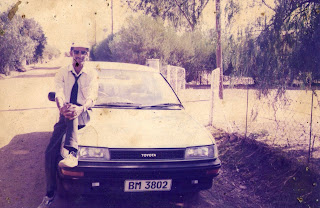In my post on April 18, I mentioned the importance of outdoor games to children. I am sure that you would agree with my point of view.
When we were children, we used to go out in the evenings and play simple games such as hide and seek. During summer, when the whether was very hot, we used to get ourseves involved in hobbies such as making cardboard houses. Later, I had the pleasure of involving my science and mathematics teaching colleagues in such activites so that the pedagogic benefits and the pleasure derived could be passed on to children. Most of my colleagues, students and their parents liked the idea.
When we were children, we used to go out in the evenings and play simple games such as hide and seek. During summer, when the whether was very hot, we used to get ourseves involved in hobbies such as making cardboard houses. Later, I had the pleasure of involving my science and mathematics teaching colleagues in such activites so that the pedagogic benefits and the pleasure derived could be passed on to children. Most of my colleagues, students and their parents liked the idea.
There are numerous ways in which simple household items with which children are familiar, can be used to teach lesson concepts. My students and teacher colleagues in different countries have enjoyed `playing' with coffee and fruit juice containers as shown below, when handling concepts such as area and volume:
Infact, even concepts such as linear equations (in middle school algebra) can be taught very effectively by using pupil friendly playway approaches.
Infact, even concepts such as linear equations (in middle school algebra) can be taught very effectively by using pupil friendly playway approaches.
If you closely observe teaching learning processes in our K-10 schools here in India, you can find that activity based approaches take a back seat. The most common reason attributed to this odd state is that our Syllabus and Examination Boards are highly quantity oriented at the cost of quality.
Yes, it is true, at the 9-12 level where Public Exam marks matter a lot. At the same time, neither our Syllabus Boards nor Exam Boards are bottle necks when it comes to using innovative and activity based approaches in K-8 classrooms. But still, many schools are reluctant to introduce these approaches because of false notion about syllabus and exam requirements and because our K-8 textbooks don't contain as much learner friendly activity based contents as they should.
Hope our textbook publishers, at least at the K-8 level, break away from their current inertia and include innovative activity based learner friendly contents. Many K-8 Mathematics and Physical Science lesson concepts can be taught effectively by using teacher and pupil friendly activities in the classroom and enabling them to be used in homework assignments.
As UNESCO stated in one of its reports, most K-10 science concepts can be taught effectively using household items.
Yes, it is true, at the 9-12 level where Public Exam marks matter a lot. At the same time, neither our Syllabus Boards nor Exam Boards are bottle necks when it comes to using innovative and activity based approaches in K-8 classrooms. But still, many schools are reluctant to introduce these approaches because of false notion about syllabus and exam requirements and because our K-8 textbooks don't contain as much learner friendly activity based contents as they should.
Hope our textbook publishers, at least at the K-8 level, break away from their current inertia and include innovative activity based learner friendly contents. Many K-8 Mathematics and Physical Science lesson concepts can be taught effectively by using teacher and pupil friendly activities in the classroom and enabling them to be used in homework assignments.
As UNESCO stated in one of its reports, most K-10 science concepts can be taught effectively using household items.



